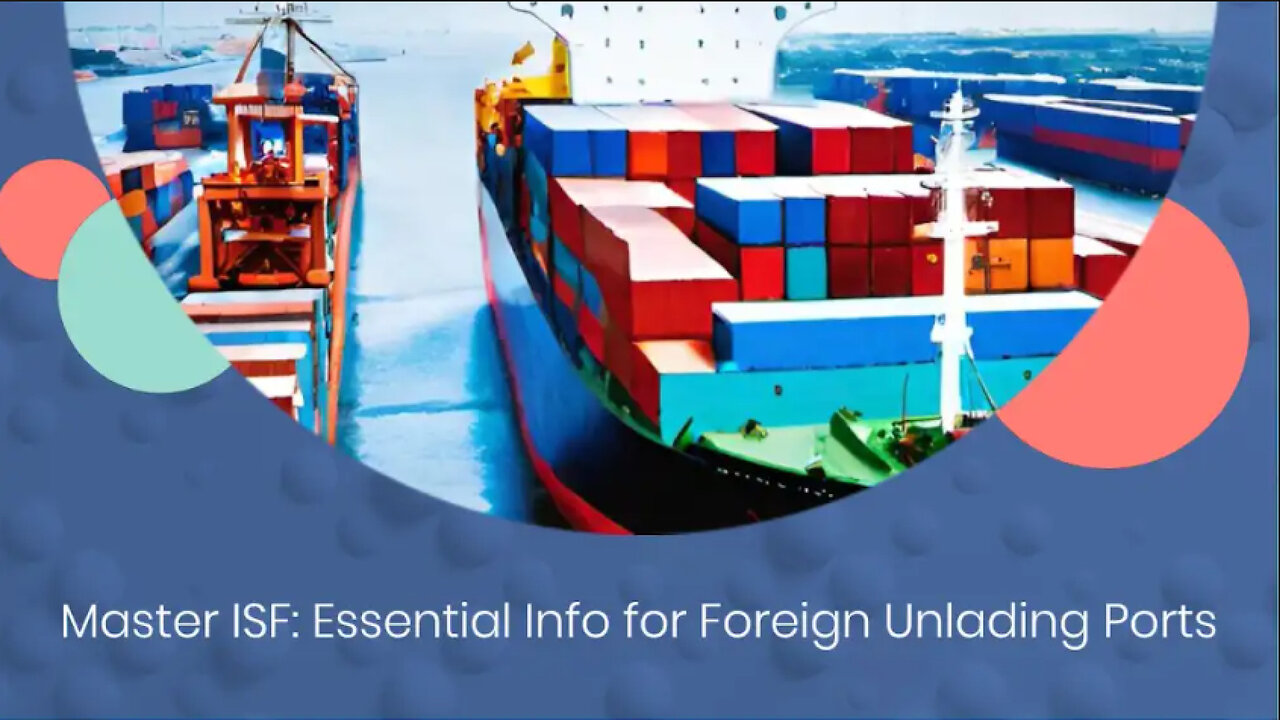Premium Only Content

Navigating the Foreign Port of Unlading: Key Details for Customs Brokerage
ISF Cargo | Phone: 786-865-0459
Email: isf@isfcargo.com | https://isfcargo.com
The Foreign Port of Unlading section of the Importer Security Filing (ISF) is a critical component of customs brokerage. This section requires specific information about the port where the cargo will be unloaded, including the full name, two-letter country code, estimated arrival date, vessel name and carrier code, and container number(s).
Providing accurate and timely information in the Foreign Port of Unlading section is essential for several reasons. First, it allows US Customs and Border Protection (CBP) to identify the exact port where the cargo will enter the US, ensuring smooth processing and efficient trade operations. Additionally, the country code standardizes the identification of foreign ports, preventing confusion and ambiguity.
The estimated arrival date of the vessel at the foreign port is crucial for CBP to track and monitor the movement of goods. This information helps CBP assess the risk associated with each shipment and allocate their resources accordingly. It also enables CBP to enforce any necessary security measures based on the timing of the cargo's arrival.
The vessel name and carrier code provide CBP with important verification and validation information. CBP can confirm that the cargo is being transported by a reputable carrier and establish the legitimacy of the transaction. This helps mitigate potential risks associated with fraudulent or illicit activities.
Including the container number(s) associated with the shipment is crucial for CBP to track and trace each container from its origin to its final destination in the United States. This information allows for efficient and accurate monitoring of the cargo's movement, ensuring compliance with customs regulations and facilitating effective risk assessment.
Overall, the Foreign Port of Unlading section of the ISF is a vital aspect of customs brokerage. It requires specific information about the foreign port, vessel, carrier, and container(s) to ensure smooth processing, efficient trade operations, and effective risk assessment by CBP. Accuracy and timeliness are crucial when submitting this information to maintain efficient international trade.
#usimportbond #isfcustomsbroker #uscustomsclearing #isfentry
Video Disclaimer Here: This content is for educational use and not associated with any US government body.
0:15 - Information required includes full name and country code of foreign port, estimated arrival date, vessel name and carrier code, and container number(s)
1:32 - Helps CBP track and monitor movement of goods across borders
2:35 - Ensures smooth processing and efficient international trade
-
 2:33:15
2:33:15
Tundra Tactical
5 hours ago $5.97 earnedLuis Valdes Of GOA Joins The Worlds Okayest Firearms Live Stream!!!
19.2K -
 1:03:41
1:03:41
Man in America
13 hours agoAre Trump & Musk the COUNTER-ELITES? w/ Derrick Broze
53K30 -
 3:45:08
3:45:08
DLDAfterDark
4 hours ago $7.62 earnedDLD Live! SHTF Handguns! Which Would You Choose?
29.6K2 -
 1:50:38
1:50:38
Mally_Mouse
7 hours agoSaturday Shenanigans!! - Let's Play: Mario Party Jamboree
40.5K -
 1:13:00
1:13:00
Patriots With Grit
11 hours agoWill Americans Rise Up? | Jeff Calhoun
32.9K10 -
 14:55
14:55
Exploring With Nug
11 hours ago $10.50 earnedWe Found Semi Truck Containers While Searching for Missing Man!
50.7K7 -
 27:57
27:57
MYLUNCHBREAK CHANNEL PAGE
19 hours agoOff Limits to the Public - Pt 3
108K62 -
 38:07
38:07
Michael Franzese
11 hours agoLeaving Organized Crime and Uncovering Mob in Politics: Tudor Dixon and Michael Franzese
91.6K15 -
 2:42:54
2:42:54
Jewels Jones Live ®
2 days agoAMERICA IS BACK | A Political Rendezvous - Ep. 111
73.1K48 -
 8:47:33
8:47:33
Due Dissidence
1 day agoLIVE: Workers Strike Back Conference ft. Chris Hedges, Jill Stein, Kshama Sawant, and More!
113K57